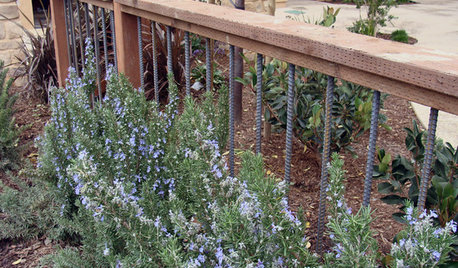industrial tomatoe prduction
alan haigh
10 years ago
Related Stories

INDUSTRIAL STYLE9 Imaginative Ideas for Industrial Rebar in the Garden
Inexpensive and unexpected, steel bar from any big-box hardware store can give your landscape an edgier look
Full Story
KITCHEN DESIGNStandouts From the 2014 Kitchen & Bath Industry Show
Check out the latest and greatest in sinks, ovens, countertop materials and more
Full Story
SHOP HOUZZHouzz Products: Save a Taste of Summer
Can't bear to part with the flavors of summer peaches, berries and tomatoes? Then jam on it!
Full Story
HOUZZ TOURSHouzz Tour: Bootlegging Past, Quirky Supper Club Present
The only crime in this newly bustling home on a Washington, D.C., lot is the sinfully delicious cooking
Full Story
FARM YOUR YARDHow to Build a Raised Bed for Your Veggies and Plants
Whether you’re farming your parking strip or beautifying your backyard, a planting box you make yourself can come in mighty handy
Full Story
SHOP HOUZZHouzz Products: Wood, White and Metal
Crisp yet warm, these furnishings and accessories for every room bring in nature in a most chic way
Full Story
URBAN GARDENSHarvest the Bounty of a Patio Garden
Make the most of small spaces on decks and balconies to enjoy your pick of vegetables, fruits and herbs
Full Story
KITCHEN DESIGN12 Farmhouse Touches That Bring Homeyness to a Kitchen
Shaker cabinetry, country-store-inspired hardware, barn elements or a key piece of art will add homestead appeal to your kitchen
Full Story
FURNITURESecond-Life Sofas Show First-Rate Style
With unexpected upholstery, antique sofas can live happily in modern interiors
Full Story
DECORATING GUIDESSo Your Style Is: Hollywood Regency
True to its Tinseltown roots, Hollywood Regency style is theatrical, elegant and ready for its close-up
Full Story



alan haighOriginal Author
yukkuri_kame
Related Discussions
Anyone willing to share thoughts about trends in the industry?
Q
Is a 5 gallon bucket big enough to grow tomatoes in?
Q
Tomato Plan-ting for this year... Thoughts?
Q
Did I ever mention how much I hate the home inspection industry
Q
alan haighOriginal Author
itheweatherman
cousinfloyd
yukkuri_kame
alan haighOriginal Author
glib
ericwi
yukkuri_kame
MrClint
cousinfloyd
NilaJones
drew51 SE MI Z5b/6a
MrClint
alan haighOriginal Author
MrClint
yukkuri_kame
NilaJones
drew51 SE MI Z5b/6a
alan haighOriginal Author
MrClint
olpea
MrClint
olpea
drew51 SE MI Z5b/6a
Ernie
yukkuri_kame
Ernie
drew51 SE MI Z5b/6a
alan haighOriginal Author
Ernie
yukkuri_kame
alan haighOriginal Author
olpea
cousinfloyd
alan haighOriginal Author
olpea
olpea
alan haighOriginal Author
northernmn
yukkuri_kame
alan haighOriginal Author
olpea
alan haighOriginal Author
Michael
yukkuri_kame
MrClint
alan haighOriginal Author
alan haighOriginal Author